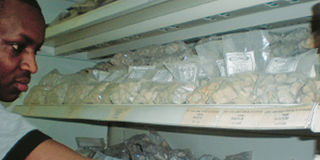City women eating tonnes of stones a week

An attendant at a leading supermarket displays stones on a shelf. Photo/DAVID NJAGI
Talk of strange eating habits. City women alone are eating four tonnes of soft stones a week, enough hardcore for a small office floor.
Stone consignments arrive in the city’s Gikomba Market from as far as Eldoret, Kisii and Tana River every Monday, and are distributed to hawkers, kiosks and leading supermarkets.
Women determined
Women are determined to satisfy their craving for these non food items, often unaware they are eating themselves and their babies to ill health. The stones, says a new study, can hinder absorption and retaintion of minerals, affecting mother and child.
Researchers from the University of Nigeria who interviewed 1,071 pregnant women attending prenatal clinic at the Pumwani Maternity Hospital in Nairobi found 800 were eaters of soil, stones and other non food items.
The phenomenon is referred to as pica, a Latin word for magpie, the bird notorious for eating almost anything.
Sophia Moraa, a hawker at Mlango Kumbwa said her customers for the stones locally called Odowa, cut across the social economic divide. “Some walk here, others drive in, while others send drivers or house girls,” said Moraa. The light-yellow soft stone is mainly excavated from Kajulu Hills in Kisumu.
Moraa can fetch as much as Sh500 daily from the rounded pebbles, each going for between one and three shillings. “The price is quite elastic, depending on the apparent worth of the customer,” she told the Nation.
A senior sales executive with a city insurance firm told of her embarrassment when while rummaging through her bag for a pen at a client’s office several stones came tumbling down. “The male CEO, I could see, was not convinced these were not charms to influence our transaction. I lost the business.” But embarrassment or not, she can’t do without nibbling away.
Overcome craving
But with determination, says Dr P.O. Ngozi in his study, Pica practices of pregnant women in Nairobi, one can overcome the craving. “About 25 of the women said although they had at one time or the other experienced strong cravings but stubbornly refused to give in. Fifteen said they achieved this by lying down and refusing to get up until the craving was over,” Dr Ngozi says in his study published in the February issue of the East African Medical Journal.
The researcher says this shows women can be helped to overcome the behaviour. “Odowa eating has spread so much in the a few years among both pregnant and non pregnant women, it has established itself as a consumer product in major cities in Kenya and beyond. “But the ingestion of pica involving soil and soft stones has been known to lead to complications such as parasite infestations, iron deficiency, anaemia and intestinal complications,” says Dr Ngozi, who added that some women described their craving as too compelling to resist.
Doctors say there are no known causes of the eating disorder in pregnancy but advance several theories including nutritional deficiency. They say pica may be the body’s natural response to a nutritional depletion, such as iron deficiency. Still, not every person with pica has a nutritional deficiency.
“Cultural factors play a role. Some take pica as a way of increasing spirituality or treating certain physical illnesses, like morning sickness,” says Dr Ngozi.
Eating substances that contain lead, says a consultant pediatrician with a city hospital, such as soil, clay, or paint, could lead to lead poisoning, which can result in death. He adds: “Eating non-food items can actually prevent your body from absorbing the proper minerals and nutrients. This could mean your baby not receiving proper nutrition, increasing the risk for a variety of complications, including low birth weight, preterm labour and stillbirth.
Eunice Wairimu, one of Ms Moraa’s customers expects to be a mother in a few months. She cannot understand where the craving for Odowa comes.
Like 89.8 per cent of the women in Kenya the researchers say eat stones, Wairimu says she started eaing Odowa in the first month of pregnancy.
“I can’t tell what is so special about this stone,” says Wairimu. “When the urge to consume it envelopes me, not even a beating from my husband can stop me.”
That is good news to Henry Masai, an Odowa trader at Gikomba hawkers’ market for the last ten years.
Masai gets his stock from Makuyu and Tana River District and according to him, his stand has never gone dry of customers.
Recently, health officers stopped at his stand for a chat and he engaged them in a conversation about the marvels of the stone.
That is how he learnt that the stone has some calcium reserves.
“All the experts I have spoken to point out that the stone is rich in calcium,” explains Masai. “It’s popular among pregnant women although I have seen cases of men consuming it.”
But council askaris are frustrating the growth of the trade and Masai suggests the emerging small scale businesses needs to be streamlined. He also laments that supermarkets are giving them a run for their money. At Ukwala Supermarket Odowa is displayed in 200, 100 and 50 grams and as Titus Mwangi explained, a satchet costs between Sh7 and Sh22.
The study concludes unless the habit is stopped it will continue with subsequent generations as a result of reinforcement, modelling and learning.




